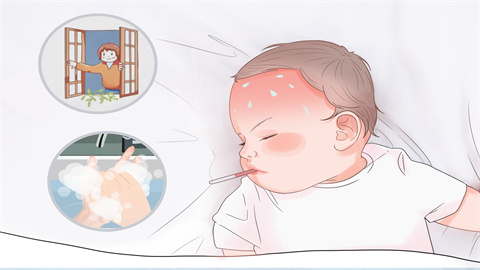What should I do if my five-month-old baby has a cold and a runny nose?
Generally, a 5-month-old baby experiencing a runny nose may be due to factors such as cold air irritation, dry environment, common cold, allergic rhinitis, or sinusitis. It is recommended to seek timely medical attention for the baby, and under a doctor's guidance, general treatments or medication may be used. Detailed explanations are as follows:

1. Cold Air Irritation
A 5-month-old baby's nasal mucosa is relatively delicate. When exposed to cold air, the nasal capillaries may constrict, leading to increased secretion from the glands and causing a runny nose. In daily life, it is important to keep the baby warm and avoid direct exposure to cold air. Wearing a mask outdoors can help reduce direct nasal irritation from cold air.
2. Dry Environment
When the environment is excessively dry, the baby's nasal mucosa can lose moisture, becoming dry and irritated, which stimulates the nasal glands to secrete more fluid, resulting in a runny nose. Maintaining indoor humidity is important and can be achieved by using a humidifier or placing water basins indoors. Additionally, regularly opening windows for ventilation helps keep the air fresh.
3. Common Cold
A cold may be caused by viral infections such as rhinovirus or coronavirus. The virus invades the nasal mucosa, causing congestion, swelling, and increased secretion, leading to a runny nose. Symptoms may also include sneezing, coughing, and fever. Medications such as pediatric paracetamol and chlorpheniramine granules, oral paracetamol solution, or pediatric cough syrup may be used according to a doctor's instructions.
4. Allergic Rhinitis
Allergic rhinitis may be triggered by allergens such as dust mites or pollen. These allergens stimulate the nasal mucosa, triggering an allergic reaction that increases gland secretion, causing a runny nose. Other symptoms may include nasal congestion, itching, and eye rubbing. Under a doctor's recommendation, medications such as cetirizine hydrochloride drops, fluticasone propionate nasal spray, or buffered physiological saline may be used for treatment.
5. Sinusitis
Sinusitis is typically caused by bacterial or viral infections, often following an upper respiratory tract infection. Inflammation within the sinuses causes nasal mucosal congestion and swelling, along with increased secretions that drain from the nose, resulting in a runny nose. Additional symptoms may include headache and reduced sense of smell. Under medical guidance, medications such as amoxicillin-clavulanate potassium granules, oxymetazoline hydrochloride nasal drops, or cefixime granules may be used for treatment.
To prevent this condition, parents should ensure the baby stays warm and avoid exposure to cold air. Additionally, maintaining a humid indoor environment can help reduce nasal mucosa dryness.







